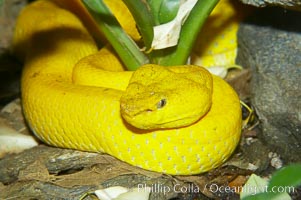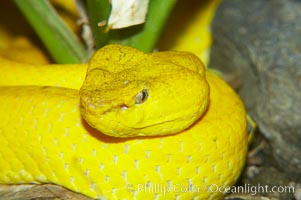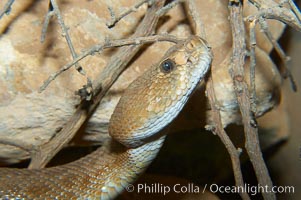
Red diamond rattlesnake. The red diamond rattlesnake is the largest rattlesnake in southern California, reaching a length of 6 feet (2m). It occurs from the coast to elevations of 5000 feet.
Species: Red diamond rattlesnake, Crotalus ruber ruber
Image ID: 12598
Species: Red diamond rattlesnake, Crotalus ruber ruber
Image ID: 12598
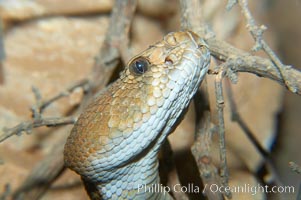
Red diamond rattlesnake. The red diamond rattlesnake is the largest rattlesnake in southern California, reaching a length of 6 feet (2m). It occurs from the coast to elevations of 5000 feet.
Species: Red diamond rattlesnake, Crotalus ruber ruber
Image ID: 12599
Species: Red diamond rattlesnake, Crotalus ruber ruber
Image ID: 12599
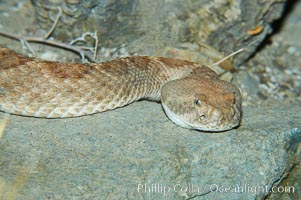
Western diamondback rattlesnake.
Species: Western diamondback rattlesnake, Crotalus atrox
Image ID: 12600
Species: Western diamondback rattlesnake, Crotalus atrox
Image ID: 12600
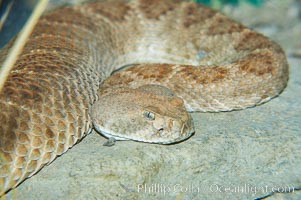
Western diamondback rattlesnake.
Species: Western diamondback rattlesnake, Crotalus atrox
Image ID: 12601
Species: Western diamondback rattlesnake, Crotalus atrox
Image ID: 12601
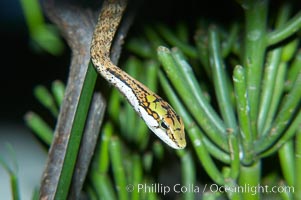
Twig snake. The twig snake is back-fanged, having its short fangs situated far back in the mouth. Its venom will subdue small prey such as rodents. Its is well camouflaged, resembling a small twig or branch in the trees that it inhabits.
Species: Twig snake, Thelotornis capensis oatesii
Image ID: 12605
Species: Twig snake, Thelotornis capensis oatesii
Image ID: 12605
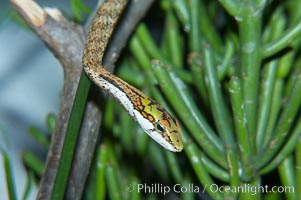
Twig snake. The twig snake is back-fanged, having its short fangs situated far back in the mouth. Its venom will subdue small prey such as rodents. Its is well camouflaged, resembling a small twig or branch in the trees that it inhabits.
Species: Twig snake, Thelotornis capensis oatesii
Image ID: 12606
Species: Twig snake, Thelotornis capensis oatesii
Image ID: 12606
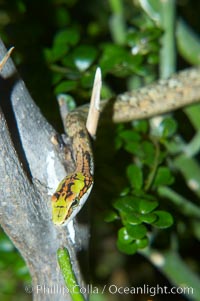
Twig snake. The twig snake is back-fanged, having its short fangs situated far back in the mouth. Its venom will subdue small prey such as rodents. Its is well camouflaged, resembling a small twig or branch in the trees that it inhabits.
Species: Twig snake, Thelotornis capensis oatesii
Image ID: 12607
Species: Twig snake, Thelotornis capensis oatesii
Image ID: 12607
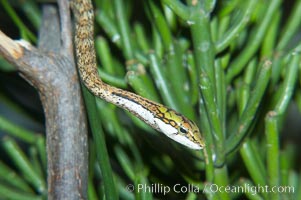
Twig snake. The twig snake is back-fanged, having its short fangs situated far back in the mouth. Its venom will subdue small prey such as rodents. Its is well camouflaged, resembling a small twig or branch in the trees that it inhabits.
Species: Twig snake, Thelotornis capensis oatesii
Image ID: 12608
Species: Twig snake, Thelotornis capensis oatesii
Image ID: 12608
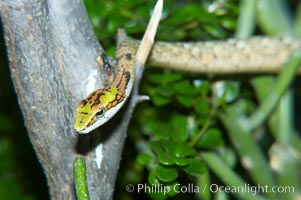
Twig snake. The twig snake is back-fanged, having its short fangs situated far back in the mouth. Its venom will subdue small prey such as rodents. Its is well camouflaged, resembling a small twig or branch in the trees that it inhabits.
Species: Twig snake, Thelotornis capensis oatesii
Image ID: 12609
Species: Twig snake, Thelotornis capensis oatesii
Image ID: 12609
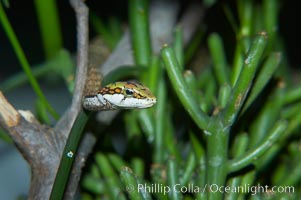
Twig snake. The twig snake is back-fanged, having its short fangs situated far back in the mouth. Its venom will subdue small prey such as rodents. Its is well camouflaged, resembling a small twig or branch in the trees that it inhabits.
Species: Twig snake, Thelotornis capensis oatesii
Image ID: 12610
Species: Twig snake, Thelotornis capensis oatesii
Image ID: 12610
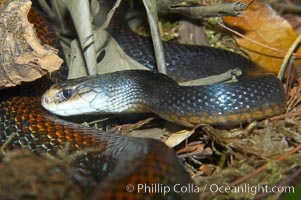
The Australian taipan snake is considered one of the most venomous snakes in the world.
Species: Australian taipan viper, Oxyuranus scutellatus
Image ID: 12626
Species: Australian taipan viper, Oxyuranus scutellatus
Image ID: 12626
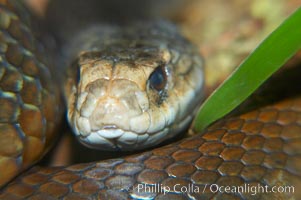
The Australian taipan snake is considered one of the most venomous snakes in the world.
Species: Australian taipan viper, Oxyuranus scutellatus
Image ID: 12627
Species: Australian taipan viper, Oxyuranus scutellatus
Image ID: 12627
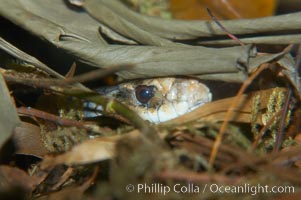
The Australian taipan snake is considered one of the most venomous snakes in the world.
Species: Australian taipan viper, Oxyuranus scutellatus
Image ID: 12628
Species: Australian taipan viper, Oxyuranus scutellatus
Image ID: 12628
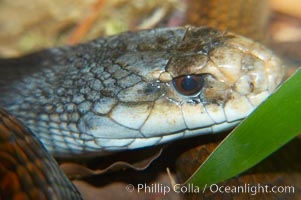
The Australian taipan snake is considered one of the most venomous snakes in the world.
Species: Australian taipan viper, Oxyuranus scutellatus
Image ID: 12629
Species: Australian taipan viper, Oxyuranus scutellatus
Image ID: 12629
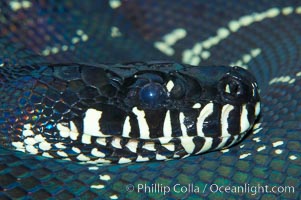
Boelens Python. This snake species, native to New Guinea, grows up to 15 feet (3m) and weigh 75 to 125 pounds.
Species: Boelen's python, Morelia boeleni
Image ID: 12730
Species: Boelen's python, Morelia boeleni
Image ID: 12730
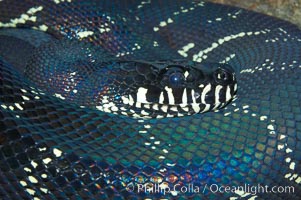
Boelens Python. This snake species, native to New Guinea, grows up to 15 feet (3m) and weigh 75 to 125 pounds.
Species: Boelen's python, Morelia boeleni
Image ID: 12731
Species: Boelen's python, Morelia boeleni
Image ID: 12731
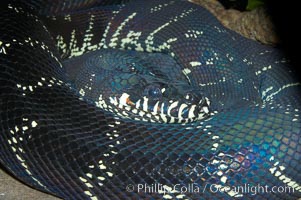
Boelens Python. This snake species, native to New Guinea, grows up to 15 feet (3m) and weigh 75 to 125 pounds.
Species: Boelen's python, Morelia boeleni
Image ID: 12732
Species: Boelen's python, Morelia boeleni
Image ID: 12732
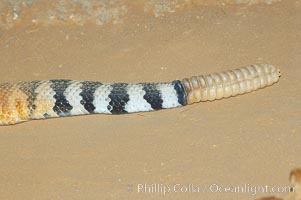
Rattle and characteristic stripes of the red diamond rattlesnake.
Species: Red diamond rattlesnake, Crotalus ruber ruber
Image ID: 12733
Species: Red diamond rattlesnake, Crotalus ruber ruber
Image ID: 12733
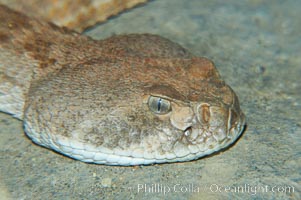
Western diamondback rattlesnake.
Species: Western diamondback rattlesnake, Crotalus atrox
Image ID: 12734
Species: Western diamondback rattlesnake, Crotalus atrox
Image ID: 12734
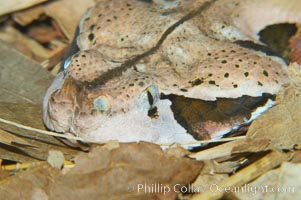
African gaboon viper camouflage blends into the leaves of the forest floor. This heavy-bodied snake is one of the largest vipers, reaching lengths of 4-6 feet (1.5-2m). It is nocturnal, living in rain forests in central Africa. Its fangs are nearly 2 inches (5cm) long.
Species: African gaboon viper, Bitis gabonica
Image ID: 12737
Species: African gaboon viper, Bitis gabonica
Image ID: 12737
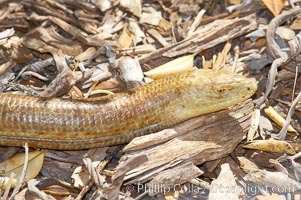
European glass lizard. Without legs, the European glass lizard appears to be a snake, but in truth it is a species of lizard. It is native to southeastern Europe.
Species: European glass lizard, Pseudopus apodus
Image ID: 12742
Species: European glass lizard, Pseudopus apodus
Image ID: 12742
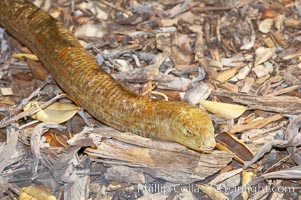
European glass lizard. Without legs, the European glass lizard appears to be a snake, but in truth it is a species of lizard. It is native to southeastern Europe.
Species: European glass lizard, Pseudopus apodus
Image ID: 12743
Species: European glass lizard, Pseudopus apodus
Image ID: 12743
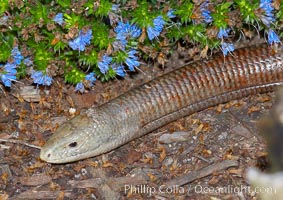
European glass lizard. Without legs, the European glass lizard appears to be a snake, but in truth it is a species of lizard. It is native to southeastern Europe.
Species: European glass lizard, Pseudopus apodus
Image ID: 12744
Species: European glass lizard, Pseudopus apodus
Image ID: 12744
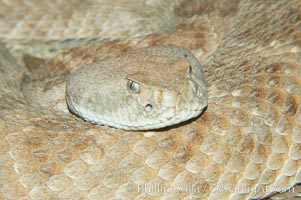
Western diamondback rattlesnake.
Species: Western diamondback rattlesnake, Crotalus atrox
Image ID: 12810
Species: Western diamondback rattlesnake, Crotalus atrox
Image ID: 12810
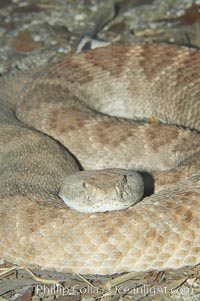
Western diamondback rattlesnake.
Species: Western diamondback rattlesnake, Crotalus atrox
Image ID: 12811
Species: Western diamondback rattlesnake, Crotalus atrox
Image ID: 12811
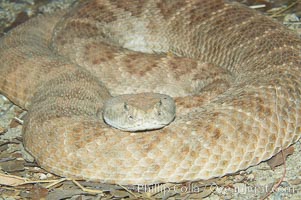
Western diamondback rattlesnake.
Species: Western diamondback rattlesnake, Crotalus atrox
Image ID: 12812
Species: Western diamondback rattlesnake, Crotalus atrox
Image ID: 12812
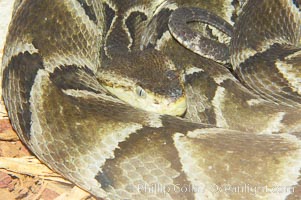
Brazilian lancehead snake, a pit viper with a highly potent venom.
Species: Brazilian lancehead snake, Bothrops moojeni
Image ID: 12815
Species: Brazilian lancehead snake, Bothrops moojeni
Image ID: 12815
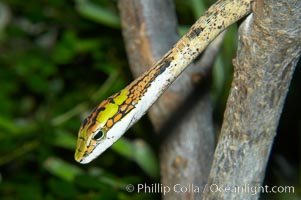
Twig snake. The twig snake is back-fanged, having its short fangs situated far back in the mouth. Its venom will subdue small prey such as rodents. Its is well camouflaged, resembling a small twig or branch in the trees that it inhabits.
Species: Twig snake, Thelotornis capensis oatesii
Image ID: 12816
Species: Twig snake, Thelotornis capensis oatesii
Image ID: 12816
